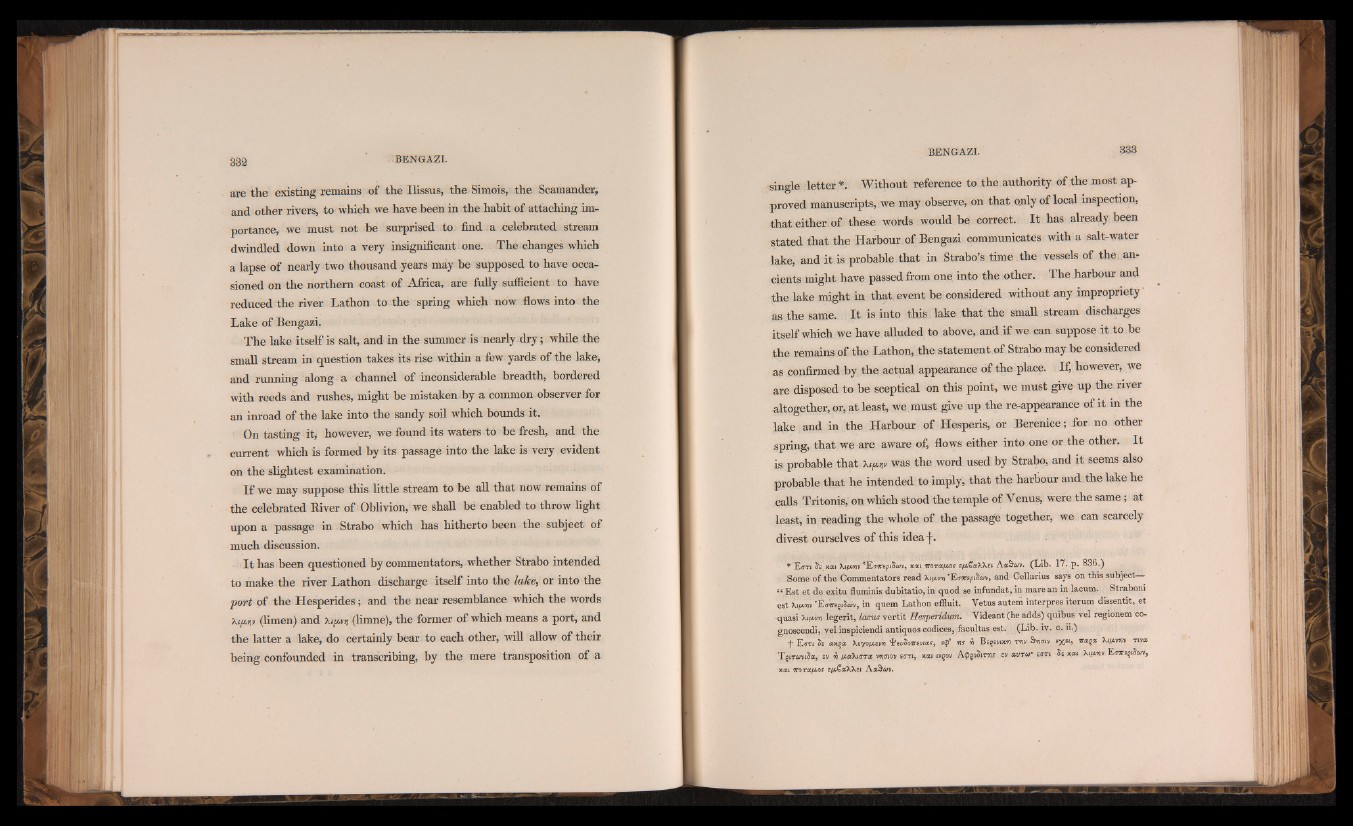
are the existing remains of the Ilissus, the Simois, the. Scamander,
and other rivers, to which we have been in the habit of attaching importance,
we must not be surprised to find a celebrated stream
dwindled down into a very insignificant one. The changes which
a lapse of nearly two thousand years may be supposed to have occasioned
on the northern coast of Africa, are fully sufficient to have
reduced the river Lathon to the spring which now flows into the
Lake of Bengazi.
The lake itself is salt, and in the summer is nearly dry; while the
small stream in question takes its rise within a few yards of the lake,
and running along a channel of inconsiderable breadth, bordered
with reeds and rushes, might be mistaken by a common observer for
an inroad of the lake into the sandy soil which bounds it.
On tasting it* however, we found its waters to be fresh, and the
current which is formed by its passage into the lake is very evident
on the slightest examination.
I f we may suppose this little stream to be all that now remains of
the celebrated River of Oblivion, we shall be enabled to throw light
upon a passage in Strabo which has hitherto been the subject of
much discussion.
I t has been questioned by commentators, whether Strabo intended
to make the river Lathon discharge itself into the lake, or into the
port of the Hesperides; and the near resemblance which the words
Xipw (limen) and (limne), the former of which means a port, and
the latter a lake, do certainly bear to each other, will allow of their
being confounded in transcribing, by the mere transposition of a
single letter*. Without reference to the authority of the most approved
manuscripts, ;we may observe, on that o.nly of local inspection,
that either; of these words would be correct. I t has already been
stated that the Harbour, of Bengazi communicates with a salt-water
lake, and it is probable that in Strabo’s time the vessels of the an-
cients might have passed from one into the other. The harbour and
the lake might in that event be considered without any impropriety
as the same. I t is into this lake that the small stream discharges
itself which we have alluded to above, and if we can suppose it to be
the remains of the Lathon, the statement of Strabo may be considered
as confirmed by the actual appearance of the place. If, however, we
are disposed to be sceptical on this point, we must give up the river
altogether, or, at least, we must give up the re-appearance of it in the
lake and in the Harbour of Hesperis, or Berenice; for no other
spring, that we are aware of, flows either into one or the other. It
is probable that was the word used by Strabo, and it seems also
probable that he intended to imply, that the harbour and the lake he
calls Tritonis, on which stood the temple of Venus, were the same; at
least, in reading the whole of the passage together, we can scarcely
divest ourselves of this idea f.
* E<m Js jcai 'ETTrspittav, kxi TrorxfMs e/x£aXXet Aa&wv. (Lib. 17. p. 836.)
Some of the Commentators read X j/x v ») 'EdsrE^wv, and Cellarius says on this subject
“ Est et de exitu fluminis dubitatio,in quod se infundat, in mare an in lacum. Straboni
est 'Eoiregi&wv, in quem Lathon effluit. Vetus autem interpres iterum dissentit, et
-quasi Xi/avti legerit, locus vertit Hespendum. Yideant (he adds) quibus vel regionem co-
gnoscendi, vel inspiciendi antiquos codices, facultas est. (Lib. i v . c. 11.)
t E*™ ^ « *§* Xsyo/AevT) V e v t io i r e v t c t f , e<p* n s r, jM a u j g m v S n a i v e x sb
T g i r am&x, ev -h p o t k i o r x v n o m e d T i, x x i »egov Aipgo^i-mr sy x v r c a ' e a r i x x i XifAy v E t r j r s ^ e o v ,
XXI TTOTXfAOr e ( a € xW s i A xScov.